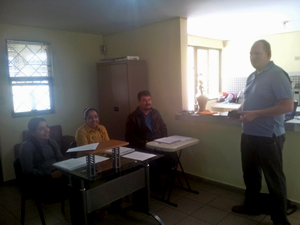Teaching English in Mexico: Great for Experience
 I had never been a teacher before I came to Mexico, but it seems to be the go-to gig for gringos and Canadians visiting from north of the border. I've heard of certain parts of Mexico having a large pool of foreign English teachers, but we seem to be plenty rare here in the northern portions of Mexico.
I had never been a teacher before I came to Mexico, but it seems to be the go-to gig for gringos and Canadians visiting from north of the border. I've heard of certain parts of Mexico having a large pool of foreign English teachers, but we seem to be plenty rare here in the northern portions of Mexico.
A Native English speaker is almost guaranteed a job offer at a language school. English learning institutes such as Harmon Hall and Berlitz have a high turn-over rate and are always looking for new hires, even those with no experience or credentials. They are customer service based and don't usually give teachers more than 15 or 20 paid hours per week. But they will pay for your work visa if you sign a contract. You don't need a degree to work at these schools; at some they would require you to take a test, which is a breeze for a native speaker.
I've worked at a language center like this before. The pay per hour was better than at academic institutes, but since they are customer-service based the hours are irregular, they give short notice for hour changes, and classes are usually only held early in the morning, after 6 p.m. in the evenings, and on the weekends.
I wanted more regular hours, so I checked out some other options. Universities and private K-12 schools seem to pay about the same. Here in Saltillo the going rate is about 50 pesos per class hour, but class preparation time is almost never paid. A language center may pay around double that at the high end. If you translate that into dollars you can get around $9/hour at a customer-service based language center, and around $4/hour at an academic institute.
From the get go, you won't make very much money teaching English in Mexico either way you look at it. But it's great for experience. Maybe you're just out of college and looking to try out a new life. That's what I was doing when I decided to make my stay in Mexico permanent.
Once you've gained permanent residency, though, you can open your own business and start your own private English school. Start-up costs are quite low compared with the U.S.
Fees for having a private school are minimal. Once you've learned how to teach, and gathered teaching materials, you are ready to advertise. The simplest form of marketing yourself is making flyers and passing them out around your neighborhood, meeting people face to face, and spreading the news about your services by word of mouth.
Private English teachers from the U.S. and Canada often make 500 pesos for an hour of class-time. That's more than $40/hour in U.S .money. The amount of money you can make is really just limited by how many classes you can schedule and how many students you can take on and retain.
And it's fun! Teaching is a very fun profession and a great experience if only to try out.
There's always work for native English speakers in Mexico, but it definitely isn't a get-rich-quick gig. I've heard about better paid teaching jobs in Asia that require lots of visa paperwork, a costly travel ticket, and a long interviewing process to secure a contract that you'll be stuck in.
Mexican culture is more up close and personal, and contracts aren't so rigid. Getting a job before coming here doesn't usually work out the way you hope. You may also want to have some sort of back-up financial plan, in case you need to go back to your country of origin or to pay for some sort of other emergency.
I recommend teaching in Mexico (if only for a month or two) to anyone with a hunger for adventure, and the time and financial cushion to do so.